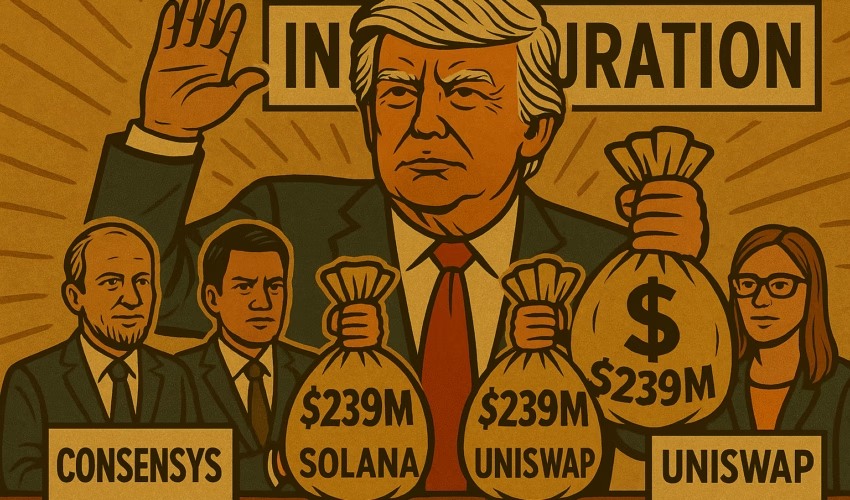FEC Filings Reveal Major Crypto Contributions Ahead of SEC Case Dismissals
Newly released Federal Election Commission (FEC) filings reveal that several high-profile crypto companies and executives made significant donations to President Donald Trump’s 2024 inauguration fund, raising questions about regulatory influence and potential conflicts of interest.
According to documents published on April 20 by the Trump-Vance Inaugural Committee, notable contributors include:
-
Uniswap CEO Hayden Adams: $245,000
-
Solana Labs: $1 million
-
Consensys: $100,000
These donations were made in January 2025, shortly after Trump’s election victory and just weeks before the SEC dropped investigations into Uniswap and Consensys in February.
Crypto Firms Line Up Behind Trump
The donations from Uniswap, Solana, and Consensys are part of a broader wave of crypto industry support for Trump. Other donors to the fund include:
-
Coinbase
-
Ripple Labs
-
Kraken
-
Ondo Finance
-
Robinhood Crypto
The fund raised over $239 million from individuals and corporations between November 15 and April 20. Other notable non-crypto contributors include:
-
McDonald’s: $1 million
-
Meta (Facebook)
-
Apple CEO Tim Cook
-
OpenAI CEO Sam Altman
-
Delta Air Lines, FedEx, ExxonMobil, Nvidia, PayPal, Target, Coca-Cola
The size and scope of the donations have prompted renewed scrutiny from both crypto skeptics in Congress and watchdog groups, especially given the timing of regulatory rollbacks under the new SEC leadership.
SEC Enforcement Drops After Trump’s Inauguration
Since Trump’s January 20 inauguration, the SEC under acting chair Mark Uyeda has moved swiftly to abandon multiple enforcement actions and investigations into major crypto firms—many of whom donated to the inaugural fund or Trump’s campaign.
In February, the SEC confirmed it had:
-
Dropped its investigation into Uniswap
-
Ended its lawsuit against Consensys
-
Signaled plans to dismiss actions involving Coinbase, Kraken, Ripple, and Robinhood Crypto
Combined, the latter three firms donated roughly $9 million to Trump’s inauguration fund, further fueling concerns over regulatory impartiality.
Trump Family’s Crypto Involvement Sparks Ethics Concerns
Adding to the controversy, President Trump and First Lady Melania Trump both launched memecoins on the Solana blockchain in January, just days before the inauguration.
Meanwhile, the Trump family is also backing World Liberty Financial, a crypto company behind a U.S. dollar-pegged stablecoin—at a time when Congress is actively debating stablecoin legislation.
Critics say these developments create ethical gray areas, especially as Trump is now in a position to influence regulatory agencies like the SEC.
“There’s a growing perception that crypto insiders are receiving preferential treatment in return for political contributions,” one legal analyst told Cointelegraph.
Crypto PACs Poised to Shape 2026 Elections
The influence of the crypto industry isn’t limited to executive donations. During the 2024 election cycle, crypto-linked political action committees (PACs) spent more than $131 million to sway key races.
The largest, Fairshake PAC, said it has over $100 million on hand—much of it sourced from donors like Coinbase and Ripple—to influence the upcoming 2026 midterm elections.
Final Thoughts: Favoritism or Free Speech?
While campaign contributions are legal and protected as free speech, the optics of regulatory leniency following multi-million dollar donations raise difficult questions about policy integrity and equal treatment under the law.
As the SEC continues to weigh over 70 crypto-related ETF applications, and with Trump-aligned figures like Paul Atkins now leading the commission, the crypto industry may find itself both empowered and under closer public scrutiny than ever before.












